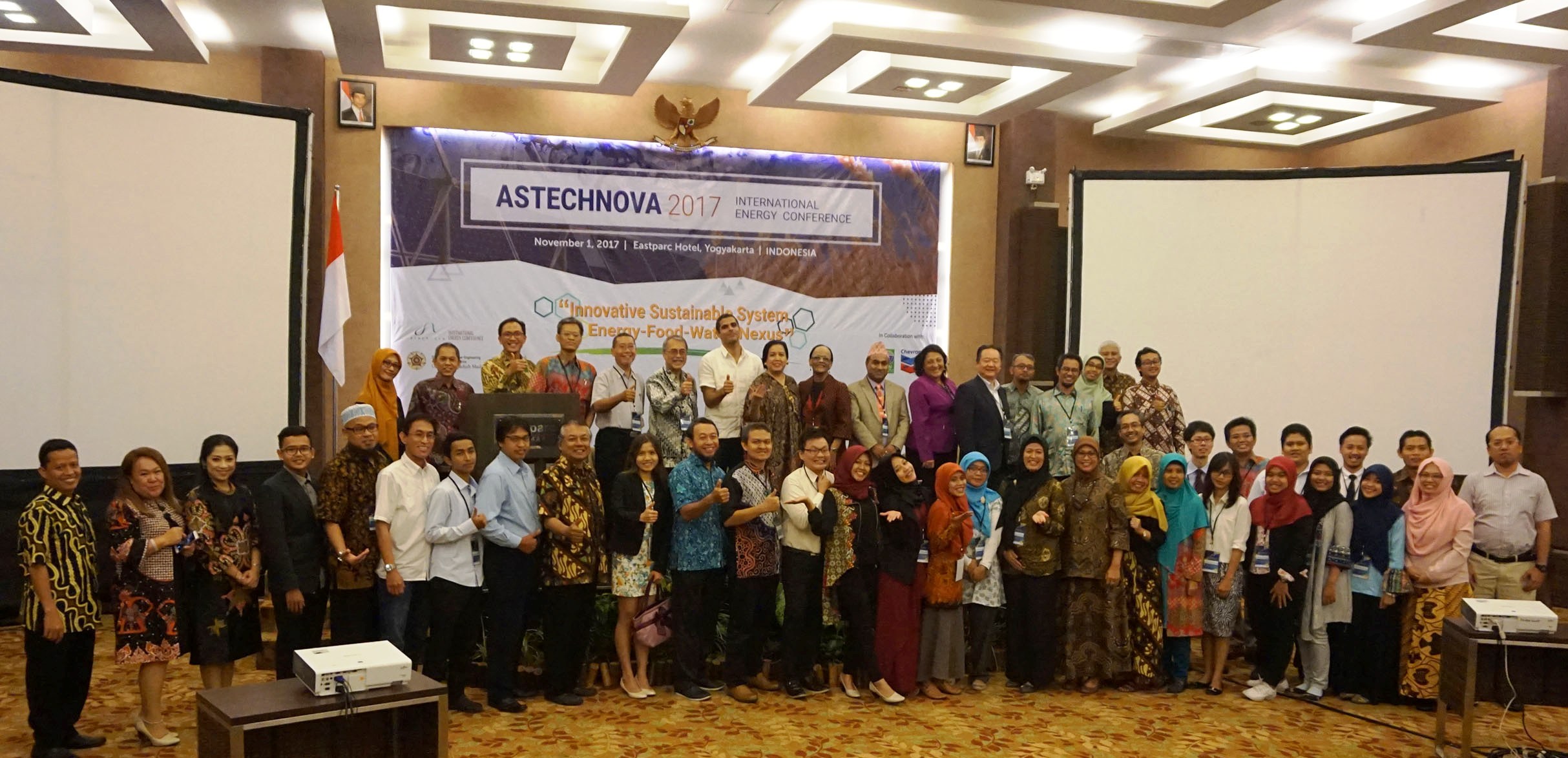|

PRESS RELEASE
ASTECHNOVA 2017--INTERNATIONAL ENERGY CONFERENCE
The Innovative Sustainable System in Energy-Food-Water Nexus: Potential for Synergy
The 3rd ASTECHNOVA 2017--International Energy Conference was held on 1st November 2017 at the East Parc Hotel Yogyakarta. The Conference was sponsored by Non-Aligned Movement-Center of South-South Technical Cooperation (NAM CSSTC), and the Department of Nuclear Engineering and Engineering Physics University of Gadjah Mada (UGM) Yogyakarta as a cooperating partner.
To address this regional challenge, the 3rd
ASTECHNOVA 2017--International Energy Conference brought together 70 participants. These included Act. Program Manager Outreach Management from the Ministry of Population and Environment Government of Nepal, the Director for Energy, Agriculture and Water from Cuba, Ambassador of Bolivarian Republic of Venezuela as well as the Tokyo Institute of Technology and other selected ministry representatives including Indonesia National Body of Technology Applied (BPPT) and respective Researchers and Academicians.
The Conference attended by representatives from civil society, private sector, International Cooperation Partners (ICPs) and the media to engage on the region’s development challenges by addressing the 3rd
ASTECHNOVA 2017--International Energy Conference held under the theme: “Innovative Sustainable System in Energy-Food-Water Nexus”, served three main objectives:
1. To create awareness and understanding of the “Water, Energy and Food Nexus”
2. To discuss concrete project examples from the region with a wide range of stakeholders from the three sectors, thus facilitating future collaboration and motivating political uptake of the nexus concept in the regions.
To ensure that the nexus approach finds consideration at the highest level, in the countries and the region as well as ensuring that the regional perspective and cooperation are taken heed of when planning at national level.
The Director of Non-Aligned Movement Centre for South-South Technical Cooperation (NAM CSST)/Senior Advisor for Political, Legal and Security affairs, Ambassador Prianti Gagarin Djatmiko-Singgih, as a Key Note Speaker, noted that the nexus perspective provides an opportunity to help the NAM member countries to apply the Integrated Water-Food-Energy-Resources Management concept as well as integration and cooperation in the management of water-food-energy resources for its various uses and demands particularly for energy and food security. She emphasized the need for the nexus and also highlighted the difficulties in working across the silo structures. In her keynote speech, she noted that: “Are we ready for a nexus thinking of Food-Energy and Water?. As ‘energy-food-water nexus’ becomes a shared endeavor by the NAM Member Countries, as well as public and private sectors, it effectively advances the guiding principles of the nexus approach. The concrete steps that NAM CSSTC have been doing to facilitate SSC through its program activities notably in the field of capacity building—thus it would be helpful to research and provide support to countries on national level planning and the design of indicators for Sustainable Development (SD) related goals and targets by utilizing the nexus approach”.
Through presentations and panel discussions held in the latter part of day, the Plenary Sessions unpacked the meaning of the Nexus approach and what it means for the region – the following are some of the key issues that came from the presentations and the Plenary Sessions: the Nexus approach and the New & Renewable Energy, Oil and Gas, Plant Engineering and Instrumentation & Control, Green Technologies, Energy Efficiency and other—these discussions on the nexus approach provides the region with an opportunity for coherent and well planned development and use of water, energy and food resources including both policy and economic instruments are important in driving the Nexus approach.
The Conference focused on exploring some examples of how the Nexus approach is being implemented at the different scales – looking at understanding what is enabling this interaction, the challenges and the institutional and policy implications.
This was done through case studies at the local and national level, and included presentations on:
Interactions between water, food and energy nexus for the country’s renewable energy policy in Venezuela Local case study on Solar Water Pumping in the Energy, Water and Food Nexus: Nepal Electricity Partnership Network in the national level program. Cuban experience in developing its bio-power plant – in the context of environmental issue in the sugar agro industry National government and private sector response on the status in Fukushima and Decommissioning Project
The Conference resulted in commitments to take immediate steps to speed up regional integrated planning and implementation of nexus issues. The stakeholders agreed to taking the following steps forward: Look at ways to institutionalize the nexus approach (for example in the energy policy), elevate the nexus discussion to the Ministers/Leaders level in charge of water, energy and food, communicate the incentives for coordination and cooperation – by highlighting the impact of not cooperating.
|

